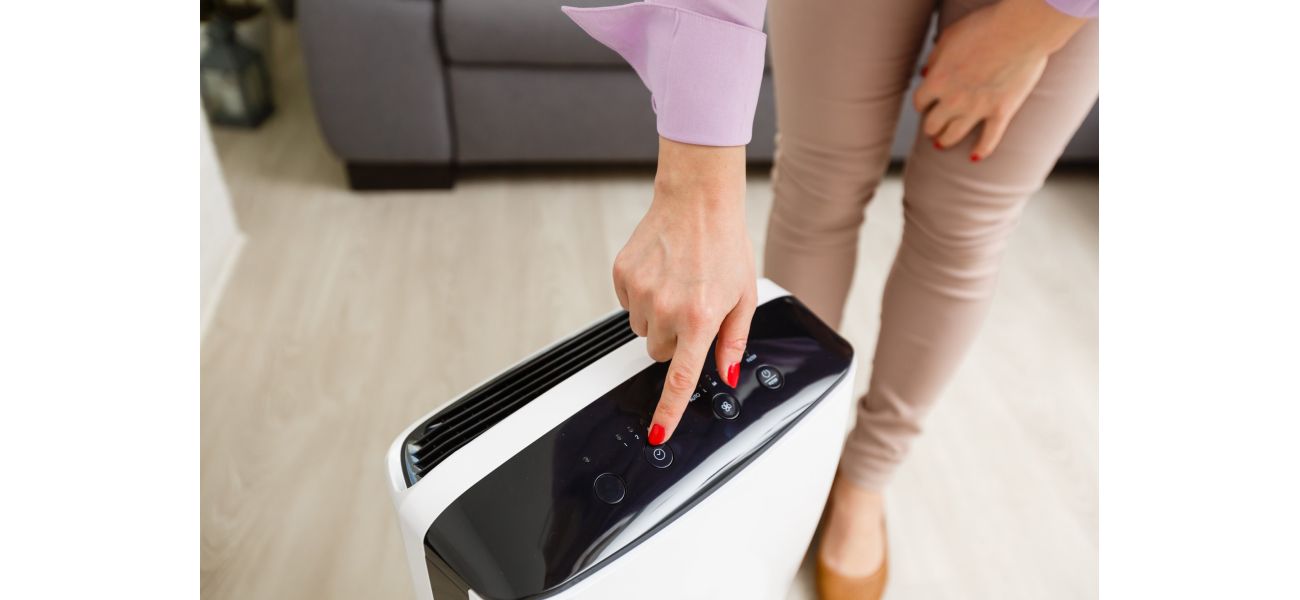Save time and money with this efficient dryer that cuts drying time in half.
Don't use radiators to dry your clothes this winter.
October 23rd 2024.

Are you worried about keeping your home warm and free of dampness this winter? As the cold season approaches, we are all faced with the yearly challenge of preventing our clothes and homes from becoming damp. But fear not, my fellow battlers! After years of experience and a spontaneous purchase, we have found an energy-efficient solution that checks all the boxes.
Introducing the almighty dehumidifier, also known as your best friend during the cold weather. You may have heard of this appliance before, as it is not exactly new. But if you're like many others who have always put off buying one or didn't even know what they do, now might be the perfect time to give it a try. Not only do dehumidifiers cut laundry drying time in half, but they also reduce the chances of mold growth and suck excess moisture out of the air, making your house feel warmer and ultimately saving you money on energy bills. The only thing it can't do is give you a nice massage after a long day, but who knows, with advancing technology, it may even do that soon.
So how does a dehumidifier work and how much does it cost to run? Well, it's quite simple. Dehumidifiers pull moisture out of the air, making it drier. This is achieved by drawing air into the system and over very cold coils, which extracts the moisture. The condensed water is then collected in the system and the air is pumped back into the room after passing over warm coils to make it room temperature. The cost of running a dehumidifier varies depending on its size and wattage. Smaller models can use as little as 22 watts, while larger ones can go up to 500 watts.
According to the Energy Saving Trust, as of July 2024, the national average price per pence/kWh of electricity was 22p. So, for example, a dehumidifier that extracts up to 20 litres of moisture per day and has a wattage of 480w would use 0.48 kWh, costing just 10p to run for one hour. On the other hand, a dehumidifier that extracts up to 12 litres per day and has a wattage of 157w would cost even less, only 3p per hour. Chris Michael, director at Meaco, also points out that the wattage of a dehumidifier is turned into heat, providing a dual benefit of reducing condensation on windows and making the room feel warmer.
But why should you consider using a dehumidifier? Well, one of the major downsides of winter is the increased moisture in the air, which not only leads to mold growth but also makes our homes feel colder. By using a dehumidifier, you can remove the excess moisture without having to constantly turn on the heating and spend more money on energy bills. This also helps prevent damage to your walls and wallpaper, as well as potential health issues caused by mold. And for those still using radiators to dry their clothes, a dehumidifier can save you time and money by quickly absorbing the moisture from your laundry.
Now, you may be wondering how much it costs to buy a dehumidifier. The good news is that they come in various sizes and wattages, so you can choose one that suits your specific needs. Smaller dehumidifiers typically cost between £20-£50, while larger ones can range from £100-£200. You can find them at many retailers, such as Amazon, Argos, John Lewis, and B&Q. And if you're looking to save some money, keep an eye out for Black Friday sales in the upcoming weeks.
In conclusion, a dehumidifier is a valuable investment for keeping your home warm and free of dampness during the winter months. Not only does it save energy and reduce the chances of mold growth, but it also makes our living spaces more comfortable. So, if you're still on the fence about buying one, now is the time to give it a try. And don't forget to share your thoughts in the comments below.
Introducing the almighty dehumidifier, also known as your best friend during the cold weather. You may have heard of this appliance before, as it is not exactly new. But if you're like many others who have always put off buying one or didn't even know what they do, now might be the perfect time to give it a try. Not only do dehumidifiers cut laundry drying time in half, but they also reduce the chances of mold growth and suck excess moisture out of the air, making your house feel warmer and ultimately saving you money on energy bills. The only thing it can't do is give you a nice massage after a long day, but who knows, with advancing technology, it may even do that soon.
So how does a dehumidifier work and how much does it cost to run? Well, it's quite simple. Dehumidifiers pull moisture out of the air, making it drier. This is achieved by drawing air into the system and over very cold coils, which extracts the moisture. The condensed water is then collected in the system and the air is pumped back into the room after passing over warm coils to make it room temperature. The cost of running a dehumidifier varies depending on its size and wattage. Smaller models can use as little as 22 watts, while larger ones can go up to 500 watts.
According to the Energy Saving Trust, as of July 2024, the national average price per pence/kWh of electricity was 22p. So, for example, a dehumidifier that extracts up to 20 litres of moisture per day and has a wattage of 480w would use 0.48 kWh, costing just 10p to run for one hour. On the other hand, a dehumidifier that extracts up to 12 litres per day and has a wattage of 157w would cost even less, only 3p per hour. Chris Michael, director at Meaco, also points out that the wattage of a dehumidifier is turned into heat, providing a dual benefit of reducing condensation on windows and making the room feel warmer.
But why should you consider using a dehumidifier? Well, one of the major downsides of winter is the increased moisture in the air, which not only leads to mold growth but also makes our homes feel colder. By using a dehumidifier, you can remove the excess moisture without having to constantly turn on the heating and spend more money on energy bills. This also helps prevent damage to your walls and wallpaper, as well as potential health issues caused by mold. And for those still using radiators to dry their clothes, a dehumidifier can save you time and money by quickly absorbing the moisture from your laundry.
Now, you may be wondering how much it costs to buy a dehumidifier. The good news is that they come in various sizes and wattages, so you can choose one that suits your specific needs. Smaller dehumidifiers typically cost between £20-£50, while larger ones can range from £100-£200. You can find them at many retailers, such as Amazon, Argos, John Lewis, and B&Q. And if you're looking to save some money, keep an eye out for Black Friday sales in the upcoming weeks.
In conclusion, a dehumidifier is a valuable investment for keeping your home warm and free of dampness during the winter months. Not only does it save energy and reduce the chances of mold growth, but it also makes our living spaces more comfortable. So, if you're still on the fence about buying one, now is the time to give it a try. And don't forget to share your thoughts in the comments below.
[This article has been trending online recently and has been generated with AI. Your feed is customized.]
[Generative AI is experimental.]
0
0
Submit Comment





